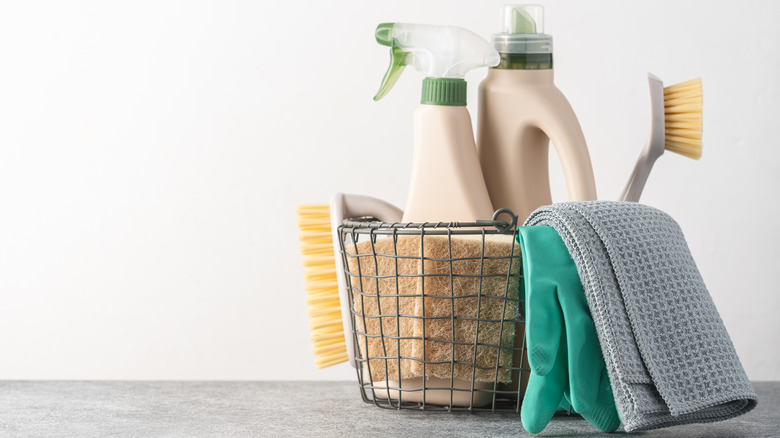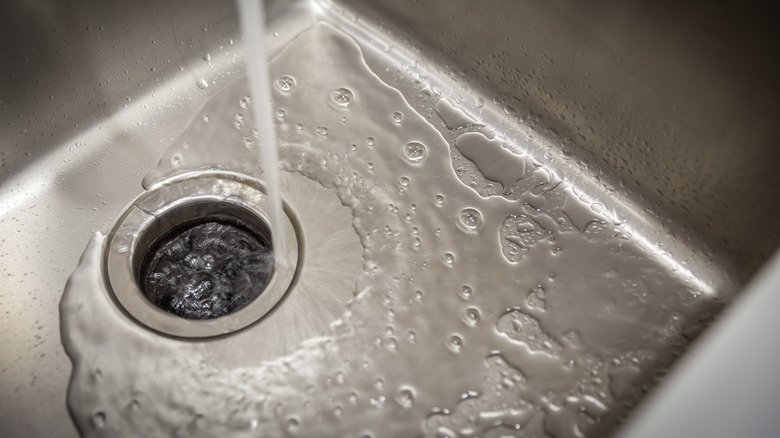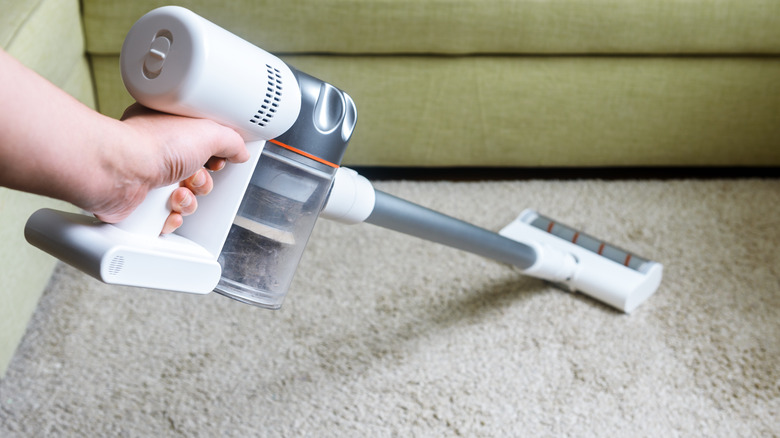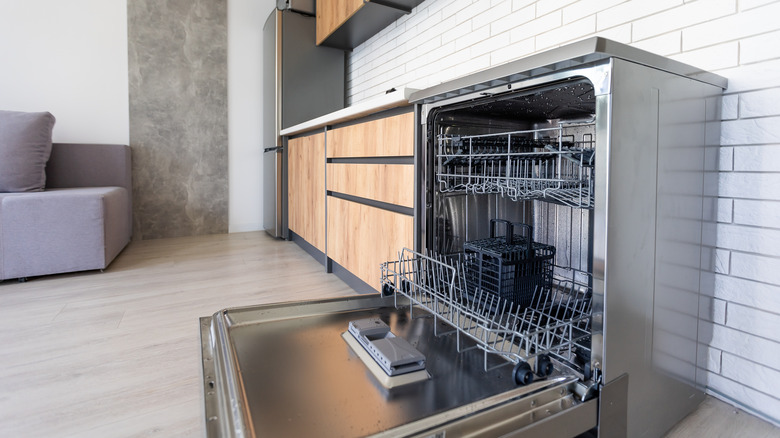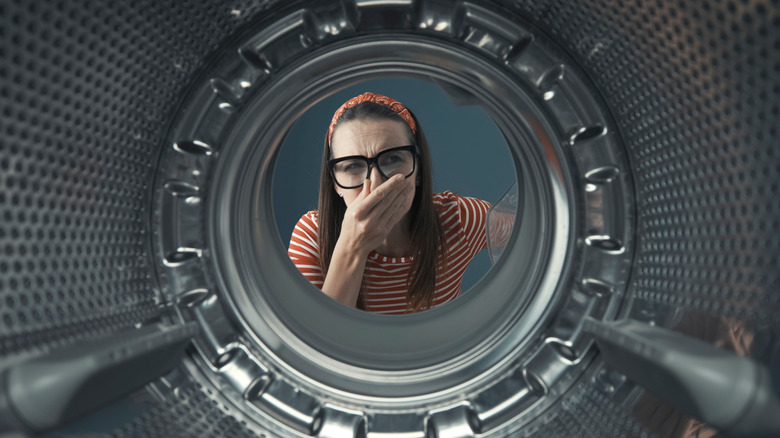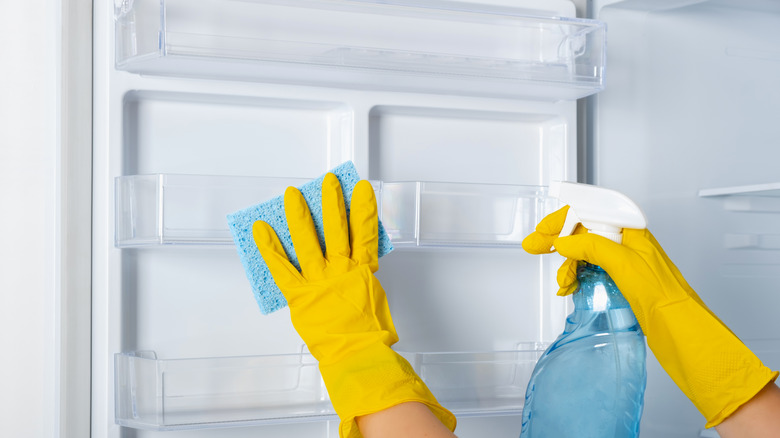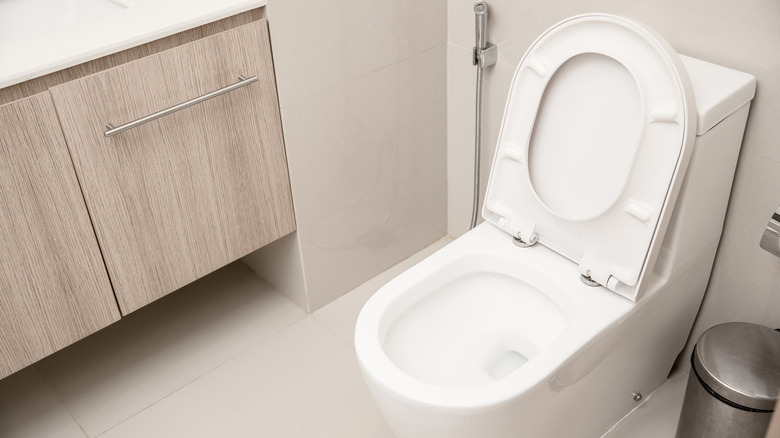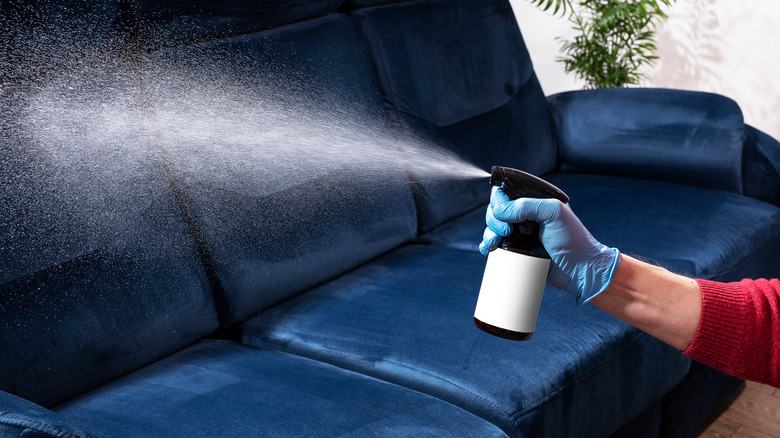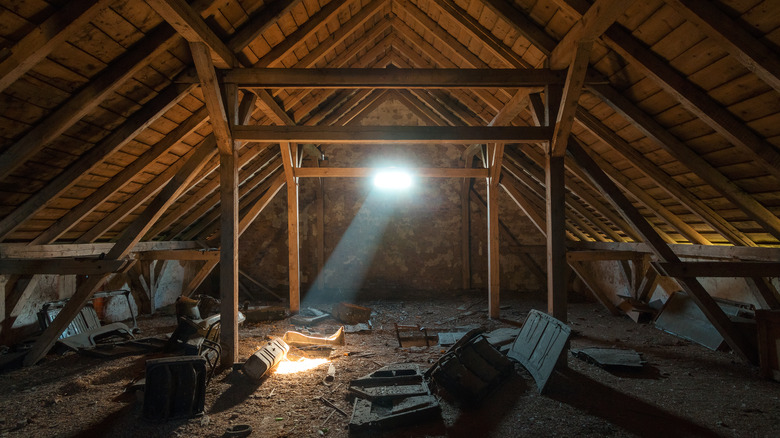How To Get Rid Of Lingering Household Odors
We may receive a commission on purchases made from links.
When a bad smell starts to form in your home it can be difficult to identify at first. While some smells come and go, others can be persistent and seemingly unfixable. Many people will start by giving their house a good clean all over, wiping up any spills, taking out the trash, doing their laundry, or changing their sheets. A lot of the time this works well, just living can cause some odors that need to be dealt with on a weekly or daily basis.
However, when regular cleaning doesn't work, remember that household odors can be caused by a multitude of problems. From your washing machine to your carpet, things all around your home harbor odor-causing bacteria and stinky debris, explains Good Housekeeping. Luckily, these smells are not too difficult to keep at bay. With a few supplies you already have sitting around, you can clean and deodorize the smelliest parts of your home in no time at all.
1. Clean your garbage disposal
According to Web MD, you should clean your garbage disposal once per week. You'll need twelve ice cubes to dislodge food particles, six lemon slices, 1 tablespoon of baking soda for deodorizing, and 1 teaspoon of bleach for sanitizing. Put all these items into the disposal except for six of the ice cubes. Turn it on and add the remaining ice cubes. As the grinding stops, turn on the cold water and let it run for about half a minute. Keep in mind this is not a permanent fix. To keep your sink smelling fresh, be sure to do this on a regular basis.
There are a few other methods you can use if you don't have all of these supplies on hand. Other ways to clean your garbage disposal include using baking soda and vinegar, citrus peels and water, ice and vinegar, ice and salt, or just mouthwash, suggests Garbage fix.
2. Clean your carpet
Cleaning and deodorizing your carpet can make a big impact on how your house smells. Carpets trap things such as dirt, hairs, and pet dander that cause odors. There are many methods for deodorizing carpets, and you might need to try a few before you find your favorite.
One popular method described by Oh So Spotless uses borax, baking soda, and essential oils. You should start by cleaning your carpet first. Depending on how soiled it is, you might simply vacuum or go as far as shampooing it. Once most of the dirt and debris are gone, mix together 1/2 cup borax, 1 cup baking soda, and about 15 drops of essential oils. Scatter the mixture onto your carpet and let it sit for an hour before vacuuming. The borax will kill mold, the baking soda will absorb liquids and odors, and the essential oils will give your carpet a fresh scent that should last a week or more.
3. Deodorize your dishwasher
Appliances that are frequently or only used with liquids are likely to cause smells in your house. Your dishwasher may sometimes go weeks or months without being cleaned. With regular disinfecting and deodorization, you can combat the smells coming from it. All you need is baking soda and vinegar.
You can deodorize several appliances with these ingredients including your toilets, sinks, and even litter boxes. To make your dishwasher smell fresh, first start by cleaning it as normal, making sure to wipe the outside. To sanitize, place 1 cup of white vinegar in a glass or a dishwasher-safe container in your empty dishwasher. Then, run a normal cycle. Once it's finished, add 1 cup of baking soda to the bottom rack and run another cycle. As told by This Old House, the vinegar will deodorize and remove build-up while the baking soda does the same thing with more abrasive scrubbing.
4. Use vinegar in the wash
To freshen your washing machine, you can skip the baking soda, says Dropps. Add 2 cups of white vinegar to your washing machine. Run the machine on hot twice, once with vinegar and once without. When the two cycles have finished, you should notice a big difference in odor. If it still smells, try wiping the outside of the machine down with a rag soaked in a solution of one part vinegar and one part water.
Front-loading washing machines tend to become smellier faster than top-loading ones. This is often due to the seal around the door. If you own a front-loading model, you should regularly clean the seal. Use the same vinegar and water solution from before to scrub it clean. There is no permanent way to keep your washing machine smelling nice, so make sure to repeat this process about once per month.
5. Activated charcoal in the refrigerator
Like other kitchen appliances we use every day, refrigerators are often the cause of nasty smells. Thankfully, it is one of the easier items to clean. If you've never cleaned a refrigerator before, it can be done in a few easy steps. Start by removing all the food and condiments as well as the drawers and shelves. In your sink, or even with your hose in the backyard, give them a good wash. While your fridge is totally empty, wipe down all the sides and any pieces that aren't removable.
Once clean, you can put everything back where it goes. To keep it smelling nice after cleaning, you can put either an open container of activated charcoal or an open box of baking soda to absorb odors, as per Pixel Fridge. This method can last for up to a month. Afterward, you should clean it again and replace the activated charcoal or baking soda.
6. Clean your toilet's s-bend
Of all the things you clean in your home, your toilet is the fixture that will become smelly very quickly. Even if you clean it regularly, odor-causing bacteria can be trapped in hard-to-reach spots. According to Cleanipedia, the S-bend traps grime every time you use and flush your toilet. If your S-bend has not been cleaned in some time it is likely the cause of the odor.
To clean it, you need to drain the toilet of water using a plunger or a siphon. Then, use a bleach toilet cleaner and work as for as possible into the bend at the bottom to eliminate germs and grime. Fill your toilet back up with water and see if you notice a difference in the smell. To make sure your toilet smells good daily, you can also drip essential oils into the toilet bowl and flush it. The oils will successfully mask the smell, but will not fix it permanently.
7. Mask smells of new furniture
When you bring new furniture into your home, it's not uncommon for the fabric to smell like chemicals. The smell, while not dangerous, can be headache-inducing or just plain annoying. Of course, you can have the piece professionally cleaned to remove the smell. But if you're looking for something to mask the smell while it wears off, there are a few things you can try.
DIY fabric refresher spray can go a long way. All you have to do is mix together 1 cup vinegar and 1/2 teaspoon of your favorite essential oils to cover the deodorization, then add 1 cup water and 1/2 teaspoon of vegetable glycerin as carriers, says Organic Authority. Alternatively, you can try the baking soda method which calls for just a few cups of baking soda. Sprinkle it all over, and let it sit for an hour or so before vacuuming it up.
8. Do away with pet smells
Owning pets is wonderful, they bring fun and love into any household. Yet, they also bring odors. If you are a pet owner, you are likely no stranger to wet dog smells or the smell of a used litter box. Many tips throughout this article can help combat the odor, particularly deodorizing your carpet and furniture.
However, there is still one more great way to limit the smell of pets in your home. Air purifiers can remove floating pet dander and other toxins with little effort. Additionally, they come in a wide range of price points and coverage options, making it simple to find a model that works great in your space.
9. Check for dead animals
What if all of the smelly elements in your home are clean? If you still smell something, and you can't find the source, you may have a larger problem. One reason for foul smells around the home can be decomposing animals in the attic, crawlspace, or ductwork, explains Trutech Wildlife Service. Unfortunately, finding the source of the odor is the hardest part. The best place to start is to search for wet spots or flies around your home.
When you find the animal, it should immediately be disposed of. Afterward, you should notice a big difference in the smell. Yet, there will likely be some lingering odors. To do away with them, you can use an enzyme cleaner. Enzyme cleaners are great at breaking down the substances leftover that are causing odors. Spray it on the affected area, let it sit, then scrub it out. This should be a permanent fix, once any liquids have lifted.
